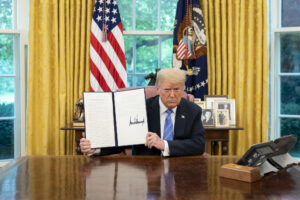It is all over, I am telling you. Finished, done with: Putin has won, we hear from all sides and, false as it may be, this grand air of resignation has all it takes to be convincing. Since – it is being explained – the Ukrainian counter-offensive has failed to push back the Russian troops, and this war has thus become a war of positions, the advantage goes to Vladimir Putin because he has more men than Ukraine.
Western sanctions, it is added, have failed to bring to its knees the Russian economy, whose ammunition lines are running at full capacity. It goes on to say that Western leaders are now more preoccupied with Hamas than with the Donbass, and the incessant bombardment of Gaza has led to accusations of selective indignation in many countries and universities. The conclusion is that everything benefits Vladimir Putin, who needs only wait for the election of Donald Trump to draw closer to the United States, distance himself from China and thus secure the ratification of a division of Ukraine, while weakening the European Union, which none of these men would wish any good for.
It is done, I am telling you, but no, I am sorry, it is actually not done at all, because let us start again.
However harsh they may be, economic sanctions are even less likely to paralyse Russia in one fell swoop than they were to force South Africa to give up apartheid or Iran to give up its theocracy. Sanctions are a slow poison that complicates and makes everything more expensive for those against whom they are imposed. They prevent them from doing many things, but there is nothing extraordinary about Vladimir Putin overcoming them. He lives with them, but if they were painless and had no effect, why would he tell the Russians that the sanctions were about to increase their difficulties?
He has done so because it would have been dangerous for him not to appear aware of this when 43% of Russians expect their economic situation to worsen and only 31% of them think, or at least say, that it will neither worsen nor improve. Putinism survives the sanctions, but it obviously suffers because even a child would know that, crutches or not, a one-legged man cannot walk as well with one leg as with two.
At the same time, this same poll belies the theory of Russia’s demographic advantage, because although Ukraine is three times less populated than Russia, has its own deserters and its troops are getting tired, 58% of Russians are opposed to a second wave of mobilisation. The reason why Vladimir Putin is not short of men already, is that he has volunteers who are seduced by the attractive contracts his army is offering. The poorest regions of the Federation are seeing their economies take off thanks to their children’s wages, but the vast majority of the country refuses to let its young people go off to the battlefield.
This is not a sign of strong support for the war, about which the polls also show for the first time – a significant development! – that more Russians (48% against 39%) would like to end it through negotiations than to see the fighting continue. For the first time too, more Russians (50% compared with 44%) disbelieve official information about the fighting than believe it.
The fact remains, one might say, that the American polls give Donald Trump a real chance of returning to the White House. That would change everything. That would give Vladimir Putin a real advantage but, for the time being, the domestic front is not smiling on him any more than the fate of the weapons in the Black Sea or on the eastern bank of the Dnieper.
There is a wave of defeatism in the Western press, fuelled by popular concern at the deteriorating international climate. Americans and Europeans are afraid that it will engulf them. They are afraid that their children will go off to fight and that bombs will rain down on their cities. The idea that Russia has already won in Ukraine reassures them because it would mean one less war, but how is Vladimir Putin on track to win?
Valeriy Fyodorov, a politologue close to the Kremlin and head of the Centre for Public Opinion Research, has just put forward an answer that is as perfectly clear as it is cynical. In a long interview with the RBK website, he explains that the “war party” represents no more than 10-15% of the Russian population, a population that had never dreamt of occupying Kiev and Odessa, but that the vast majority of Russians do not want to lose the war now that it has begun. Vladimir Putin, he said, would therefore have complete freedom to continue the fighting and, when he wished, to declare an end to it by proclaiming victory.
According to him, the Russian President has time on his side, but will he have it for much longer?
That really only depends on us, Americans and Europeans, because Vladimir Putin will only have a free hand until the day when we no longer deny Ukraine the weapons it needs to liberate itself. Everything depends on us, because it is no time for us to choose to give up when everything is shaking, from Kiev to Gaza. Everything depends on our ability to refuse to allow a Kremlin victory to project a triumph-intoxicated Russia to the very borders of the European Union, to embolden all the dictatorships that dream of putting an end to democracy, and to deceive all the peoples around the world who aspire to a historic revenge on the West. Everything depends on us, because the moment Vladimir Putin can no longer hide his defeat from the Russians, his days will be numbered.



